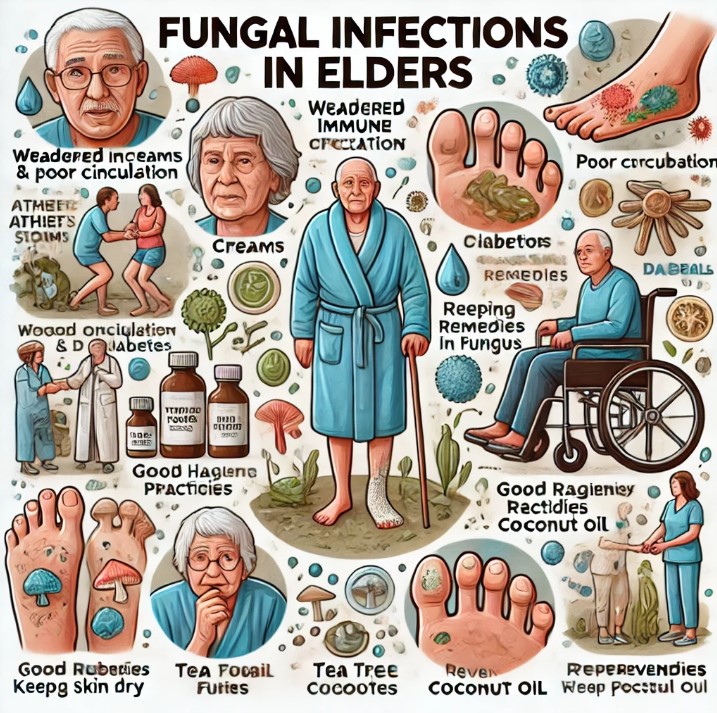As people age, their bodies’ defenses weaken, making them more susceptible to infections, including fungal infections. These infections thrive in warm, moist environments and can affect the skin, nails, and internal organs. While most fungal infections are treatable, they can pose significant health risks if not managed properly, especially in older adults with pre-existing conditions. This article provides insights into the causes of fungal infections in elders and effective remedies for managing and preventing them.
Common Fungal Infections in Elders
- Athlete’s Foot (Tinea Pedis) is a fungal infection of the skin of the feet that causes itching, scaling, and redness. It commonly occurs between the toes.
- Toenail Fungus (Onychomycosis): This infection causes thickened, discolored nails that become brittle and difficult to cut.
- Yeast Infections (Candidiasis): Yeast infections, caused by Candida fungi, often affect areas like the mouth, genitals, or skin folds.
- Ringworm (Tinea Corporis): A skin infection that causes circular, itchy rashes with clear canters and scaly edges.
Causes of Fungal Infections in Elders
Weakened Immune System
As people age, their immune systems become less effective at fighting off infections, including fungal infections. Elders are more prone to these infections because their immune responses are slower, making it easier for fungi to grow and spread.
Diabetes and Other Chronic Conditions
Chronic illnesses, especially diabetes, increase the likelihood of developing fungal infections. High blood sugar levels in diabetics promote fungal growth, particularly on the feet and in skin folds. Furthermore, diabetes can slow wound healing, making fungal infections harder to treat.
Decreased Mobility
Older adults often experience reduced mobility, which can lead to prolonged periods of sitting or lying down. This can cause areas like the groin, armpits, or under the breasts to stay warm and moist, creating an ideal environment for fungal infections.
Poor Circulation
Aging often results in poor blood circulation, particularly in the extremities like the feet. Reduced blood flow makes it harder for the body to fight off infections, increasing the risk of fungal infections such as toenail fungus or athlete’s foot.
Use of Medications
Certain medications commonly taken by elders, such as antibiotics, corticosteroids, or immunosuppressants, can increase the risk of fungal infections. These medications disrupt the balance of microorganisms in the body, leading to fungal overgrowth.
Enironmental Exposure
Elders living in communal settings, such as nursing homes or assisted living facilities, are more exposed to environments where fungi can easily spread. Shared showers, towels, and footwear can transfer fungal spores, leading to infections.
Remedies for Fungal Infections in Elders
Topical Antifungal Treatments
For mild to moderate fungal infections, topical antifungal creams, powders, and ointments can be highly effective. Products containing clotrimazole, miconazole, or terbinafine can be applied directly to the affected area to kill the fungi and reduce symptoms like itching and redness. These treatments are commonly available over the counter but should be used consistently for effective results.
Oral Antifungal Medication
For more severe or persistent fungal infections, oral antifungal medications such as fluconazole, itraconazole, or terbinafine may be prescribed. These medications are especially effective for infections that affect the nails or deep layers of the skin. However, oral antifungals should be used cautiously in elders as they may have side effects or interact with other medications.
Natural Remedies
Some elders prefer natural remedies to treat fungal infections, as these may offer relief with fewer side effects:
- Tea Tree Oil: Known for its antifungal and antiseptic properties, diluted tea tree oil can be applied to fungal infections of the skin and nails. It helps reduce itching and inflammation while attacking the fungi.
- Coconut Oil: This oil contains antifungal fatty acids that can help treat mild fungal infections. Applied to the skin or nails, it also provides moisturizing benefits.
- Garlic: Crushed garlic can be applied to fungal infections as it contains compounds that have antifungal properties. Garlic supplements can also be taken to boost the immune system.
- Apple Cider Vinegar: Its acidic nature can help balance the skin’s pH, making it less hospitable to fungi. Diluted apple cider vinegar can be applied to the infected area or used as a foot soak.
Good Hygiene Practices
Maintaining proper hygiene is crucial for preventing and managing fungal infections, especially for elders. Some tips include:
- Keep Skin Dry: Moisture encourages fungal growth, so it’s important to keep skin folds, feet, and other susceptible areas dry. Use absorbent powders if necessary.
- Wear Breathable Clothing: Loose-fitting, cotton-based clothing helps reduce moisture buildup, while frequent changing of socks and shoes can keep the feet dry.
- Avoid Sharing Personal Items: Fungal infections can spread easily through shared items like towels, shoes, or grooming tools. Personal items should not be shared to reduce the risk of infection.
- Proper Foot Care: Regularly washing and drying feet thoroughly, especially between the toes, can prevent athlete’s foot. Elders should also avoid walking barefoot in communal areas like gyms or pools.
Dietary Adjustments
Diet plays a crucial role in immune function and can help prevent fungal infections. Probiotics, found in yogurt and fermented foods, help maintain healthy gut bacteria, which can inhibit the overgrowth of harmful fungi like Candida. Reducing sugar intake is also important, as fungi feed on sugar, and a diet high in sugar can promote fungal growth.
Medical Intervention for Severe Cases
If fungal infections persist or become widespread, medical intervention may be required. A healthcare provider can prescribe stronger antifungal treatments or suggest procedures like laser therapy for stubborn toenail fungus. In extreme cases, surgery may be needed to remove severely infected nails.
Regular Monitoring
For elders, particularly those with conditions like diabetes, regular monitoring of areas prone to fungal infections is crucial. Caregivers should pay special attention to the feet, nails, and skin folds, checking for early signs of infection. Early detection and treatment can prevent complications.
Preventive Measures for Elders
- Wear Protective Footwear: Wearing shoes in communal showers or around pools can help prevent fungal infections like athlete’s foot.
- Boost Immune Health: A strong immune system helps prevent infections. Elders should focus on a healthy, balanced diet, regular exercise, and managing chronic conditions to strengthen their immunity.
- Manage Blood Sugar Levels: For those with diabetes, keeping blood sugar levels under control is essential to reducing the risk of fungal infections.
Conclusion
Fungal infections are common among elders due to various factors like a weakened immune system, reduced mobility, and chronic health conditions. However, with proper care, these infections can be managed and prevented. By following good hygiene practices, using antifungal treatments, and incorporating natural remedies, elders can effectively combat fungal infections. Preventive measures such as wearing appropriate footwear, maintaining a healthy diet, and monitoring for early signs of infection are essential to maintaining overall health and well-being in older adults.



